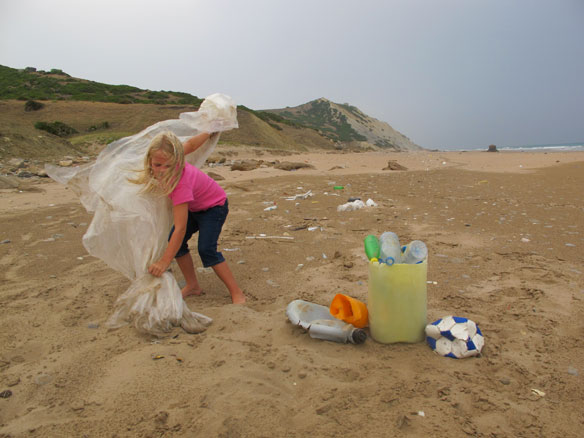
“The unprecedented plastic waste tide plaguing our oceans and shores, can become as limited as our chosen relationship with plastics, which involves a dramatic behavioral change on our part…”
Captions and Photo: © SAF — Coastal Care
Excerpts;
Scientists identified a new species of bacteria, which they named Ideonella sakaiensis 201-F6, that could almost completely break down a thin film of PET, after six weeks at a temperature of 86 degrees Fahrenheit (30 degrees Celsius). The bacterium is the first strain having a potential to degrade PET (a durable plastic) completely into carbon dioxide and water…
An estimated 342 million tons of plastic are produced annually worldwide, and currently, only about 14 percent is collected for recycling, according to the World Economic Forum…
Here’s How Much Plastic Ends Up In the World’s Oceans,The Time (02-13-2015)
Every year, 8 million metric tons of plastic end up in our oceans, it’s equivalent to five grocery bags filled with plastic for every foot of coastline…
Plastic now pollutes every corner of Earth, Guardian UK (01-25-2016)
Humans have made enough plastic since the second world war to coat the Earth entirely in clingfilm, an international study has revealed…
Plastic Contaminates Ocean Sourced Table Salt, Scientific American (10-30-2015)
When researchers analyzed fifteen brands of common table salt bought at supermarkets across China, they found among the grains of seasoning micro-sized particles of plastic. The highest level of plastic contamination was found in salt sourced from the ocean…
Biodegradable Plastics Are Not the Answer to Reducing Marine Litter, UN News Center (11-23-2015)
From oil use to ocean pollution: five facts about the plastics industry, Guardian UK (01-24-2016)
The world of plastics is in drastic need of reform. A new report released at Davos highlights some startling facts about the huge environmental and resource impacts of a fast growing plastics industry…
To clean up ocean plastics, increase focus on coasts, Science Daily (01-19-2016)
The most efficient way to clean up ocean plastics and avoid harming ecosystems is to place plastic collectors near coasts, according to a new study…
Plastic pollution: When The Mermaids Cry: The Great Plastic Tide, Coastal Care








